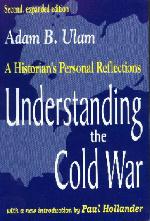
| Appreciations | Homepage | Adam Ulam's Memoir |
| Book Reviews | Lwów and America | Letters from Lwów, Part I |
| Articles | About Stanislaw Ulam | Letters from Lwów, Part II |

Preface to the Transaction Publishers EditionProf. Ulam died on March 28, 2000, in Cambridge, Mass., in his seventy-eighth year, shortly after finishing this, his twentieth book. Knowing that it would be his final book, and hoping to see it in print before he died, Adam decided with my help to publish it under the auspices of his own publishing company, which he founded from his hospital bed. He named it "Leopolis Press," after the medieval Latin name of Lwow, Poland (now Lviv, Ukraine), where he was born and which had the lion as its emblem.The book was not intended as a formal work of scholarship. Adam's account of his education in Lwow, and of his life in America as a student and professor, continually gave way to his historian's passion for understanding the meaning of great events. Though he reminisced about the vanished way of life he experienced growing up in Lwow in the 1920s and 30s, he directed most of his energy to a commentary on trends in America and the world, and a reflection on the extraordinary events of the 1980s and 1990s in Eastern Europe and Russia, all told with the exceptional style and wit that puts his writing into a unique category. Repeatedly praised for his prescience, he ended his book : "We are in for a long period of uncertainty and danger. And differently from during the Cold War, the challenge to the United States and other democracies is all the greater because the danger will be continually shifting in its nature and identity." Adam entitled it Understanding the Cold War: A Historian's Personal Reflections. What he meant by this title is subject to interpretation. Rather than a rigorous scholarly analysis of how best to understand the Cold War, I believe he meant "understanding" to refer to how he himself came to understand the Cold War, and this evolution of understanding is as autobiographical as any of his "personal reflections." The emergence of new biographical material illuminating his life in Poland and the early years in the United States demands its inclusion in the Transaction Publishers edition. To suggest the contours of what Adam did not set down, or of what he himself did not know, about events that shaped his past, I have assembled in this book passages by those who spoke about Adam, or about matters of which he himself was unable to speak. One of these was the Holocaust, which, although he seldom mentioned it, was very much with him for the rest of his life. It must be emphasized, however, that he never saw himself as a "victim." He was raised as an assimilated Polish Jew; and after he came to this country, he assimilated himself into American culture. The biographical passages of this book describe Adam Ulam's personal and scholarly voyage. Adam's accounts of his story were characterized by what Stephen Kotkin (in his review of the memorial edition, entitled "Kremlinologist as Hero"), calls ". . .The zestful storyteller who favors the wink and nod . . .the telling anecdote." They were that. But considering his life now, it seems to me that Adam's existence despite his highly successful professional career had both poignant and tragic undertones. His story begins with his early years in the beautiful, highly civilized, intellectually vibrant, cultivated city of Lwow with its fine balance of ethnic and religious groups, and follows with his abrupt, life-saving departure from Poland at age seventeen. The sudden, dreadful destruction of that way of life brought with it haunting, if repressed, nightmares of what happened to those left behind. It continues with his and his brother Stanislaw's unexpected impoverished state after reaching these shores, with Adam's legal status in this country in jeopardy until 1944, his education dependent on his older brother's meagre resources. To realize, in the light of this background, that he devoted the rest of his life to seeking an understanding of how the 20th Century could unleash such terrible forces is to demonstrate that Adam Ulam was indeed "Kremlinologist as Hero." Mary H. B. Ulam |